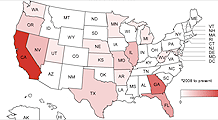Bank failures: '09 tally reaches 23
Cape Fear Bank in Wilmington, N.C., and New Frontier Bank of Greeley, Colo. were shuttered. The closures will cost the FDIC an estimated $801 million.
NEW YORK (CNNMoney.com) -- Two banks failed Friday, bringing the 2009 tally to 23, according to the government.
Cape Fear Bank of Wilmington, N.C., and New Frontier Bank of Greeley, Colo., closed their doors for the last time Friday, said the Federal Deposit Insurance Corporation.
Charleston, S.C.-based First Federal Savings and Loan Association of Charleston will assume control of all Cape Fear's deposits.
The failure of Cape Fear will cost the Deposit Insurance Fund an estimated $131 million, according to the FDIC.
Cape Fear Bank held assets worth $492 million and total deposits of $403 million as of March 31, according to the FDIC.
For New Frontier, the FDIC created the Deposit Insurance National Bank of Greeley which will remain open for roughly 30 days to allow depositors time to open accounts at other insured institutions. San Francisco-based Bank of the West will provide operational management.
At the end of the 30-day transition period, the FDIC said it will mail checks to those depositors who have not closed or transferred their accounts during the transition period.
The FDIC said the failure of New Frontier will cost the Deposit Insurance Fund an estimated $670 million. New Frontier held total assets of $2 billion and total deposits of about $1.5 billion as of March 31.
The FDIC will continue to fully insure individual accounts up to $250,000 through the end of 2009.
Bank failures in 2009 have become a near-weekly occurrence, and regional banks have come under significant pressure during the recession. A total of 25 banks failed in 2008.
Rising unemployment has made it hard for many consumers to keep up with expenses, and has led to a higher default rate. As a result, credit has been extremely tight as banks have been fearful of lending to cash-strapped customers.
Banks are also wary of rising writedowns stemming from the rapid decline in home prices, which has left mortgage-backed assets almost worthless. Many remain reluctant to lend, despite several actions taken by the government to inject liquidity into the economy.
To determine how much capital banks need, the government began "stress tests" to see which institutions would survive under worse-than-expected economic conditions.
President Obama met Friday with top financial regulators to discuss the tests. Officials have said they will release the results by the end of April.
Once the stress tests are complete, banks will have six months to raise any needed cash through the private market or take government funds.
Another government plan would use public-private investment funds to soak up the banks' toxic assets and clean their balance sheets.
Kenneth Musante, CNNMoney.com staff writer, contributed to this report ![]()



